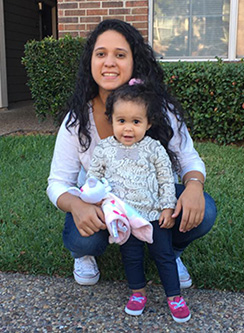My Remittance Experience
In 2001, Texas Appleseed convened a focus group to determine what problems immigrant communities faced with respect to financial services. One of the main problems that emerged was a lack of transparency in the remittance industry. Fees varied wildly among storefronts, and there was no guarantee that the money would arrive on time, or that the correct amount would be delivered.
Appleseed worked with individuals and financial service stakeholders to identify solutions. Next, we wrote those solutions into policy and market changes. In 2013, just over a decade after we began this work, the Consumer Financial Protection Bureau issued a rule requiring greater transparency with respect to transaction costs, transaction cancellation, and error resolution. That means that today, people like Angela can send money with confidence knowing that their families abroad will receive the amount they need when they need it.
 I came to the United States from Honduras in 2009 to have a better life. I immediately enrolled in the University of St. Thomas, and eventually graduated with a major in International Development and a minor in Economics. I am passionate about helping other immigrants navigate the U.S. immigration system, so I have spent the last few years working as a legal caseworker in the immigration department of a Houston nonprofit.
I came to the United States from Honduras in 2009 to have a better life. I immediately enrolled in the University of St. Thomas, and eventually graduated with a major in International Development and a minor in Economics. I am passionate about helping other immigrants navigate the U.S. immigration system, so I have spent the last few years working as a legal caseworker in the immigration department of a Houston nonprofit.
I feel like I have built a successful life for myself and my family (I am married and have a one year-old daughter). A lot of this success is due to the fact that my father sent remittances from Boston to my mom in Honduras, allowing me to go to a bilingual school in La Ceiba, the town where I’m from. His support also helped me attend college in Honduras for two years before moving to the U.S. Without that support, I wouldn’t have learned English in my home country. When I moved to the U.S., I would have had to take years of English classes before even thinking about college.
Today, I am the one sending remittances to Honduras. My job allows me to send money to my aunt approximately once every three months. Without this support, my aunt tells me she would be struggling to buy food and pay the electric bill.
I use an app on my phone to send money home. But a lot of other hondureños here use Western Union and other remittance stores. My family and I have never had a problem sending or receiving remittances. I am so glad that Texas Appleseed fought for regulations in the remittance industry. Before those regulations, companies took advantage of people. Now it’s not something that’s out of people’s control.
This post is part of Texas Appleseed’s 20th anniversary celebration. Between now and the end of December, we’re celebrating 20 of our proudest accomplishments. Learn about the rest of our work here and on social media. Donate now if you want to support the next 20 years of fighting for justice.

